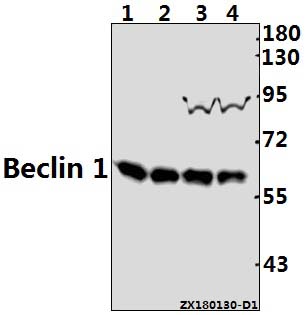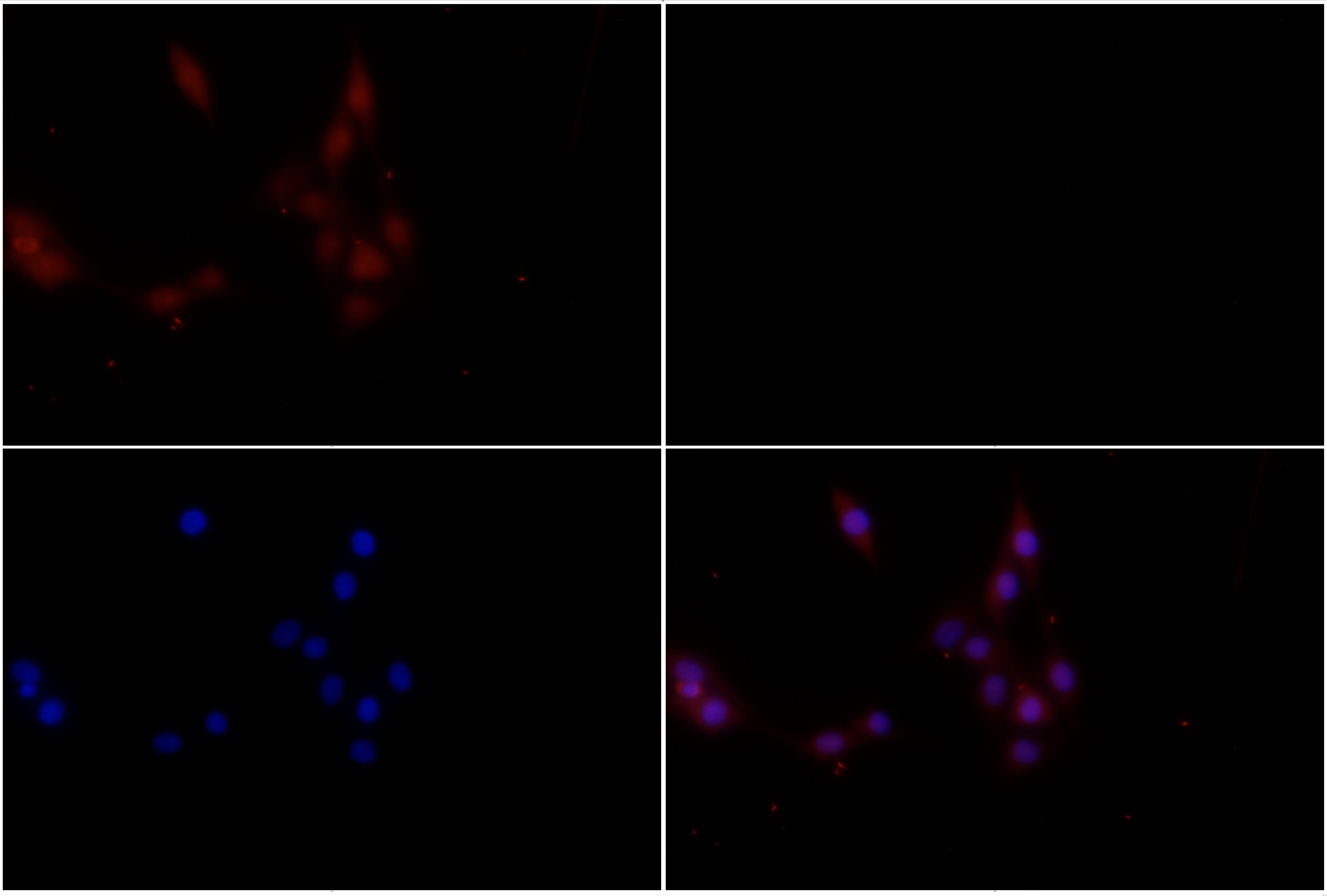Product Name :
Beclin 1 polyclonal antibody Background :
BECN1 (beclin 1) is a coiled-coil protein that has been implicated as an inhibitor of tumorigenesis. BECN1, which associates with Bcl-2, plays a significant role in autophagy. Autophagy is the degradation of cellular proteins in the lysosomes, and when this pathway is suppressed, cell growth is deregulated. Autophagy is controlled by the same signal transduction pathway that induces the phosphorylation of the ribosomal protein S6, and both are mediated via amino acids. BECN1 expression in various carcinoma cell lines, such as MCF7, is low, whereas it is ubiquitously expressed in normal breast tissue. In transfected MCF7 cells, BECN1 complements autophagocytosis and, subsequently, inhibits cellular proliferation. Additionally, BECN1 shares structural similarity to the yeast autophagy gene product, APG6, and was one of the first mammalian proteins discovered to mediate autophagy. Product :
Rabbit IgG, 1mg/ml in PBS with 0.02% sodium azide, 50% glycerol, pH7.2 Storage&Stability :
Store at 4°C short term. Aliquot and store at -20°C long term. Avoid freeze-thaw cycles. Specificity :
Beclin 1 polyclonal antibody detects endogenous levels of Beclin 1 protein. Immunogen :
Recombinant fragment corresponding to a region within amino acids 141-451 of Human Beclin 1. Conjugate :
Unconjugated Modification :
Unmodified
Beclin 1 polyclonal antibody Background :
BECN1 (beclin 1) is a coiled-coil protein that has been implicated as an inhibitor of tumorigenesis. BECN1, which associates with Bcl-2, plays a significant role in autophagy. Autophagy is the degradation of cellular proteins in the lysosomes, and when this pathway is suppressed, cell growth is deregulated. Autophagy is controlled by the same signal transduction pathway that induces the phosphorylation of the ribosomal protein S6, and both are mediated via amino acids. BECN1 expression in various carcinoma cell lines, such as MCF7, is low, whereas it is ubiquitously expressed in normal breast tissue. In transfected MCF7 cells, BECN1 complements autophagocytosis and, subsequently, inhibits cellular proliferation. Additionally, BECN1 shares structural similarity to the yeast autophagy gene product, APG6, and was one of the first mammalian proteins discovered to mediate autophagy. Product :
Rabbit IgG, 1mg/ml in PBS with 0.02% sodium azide, 50% glycerol, pH7.2 Storage&Stability :
Store at 4°C short term. Aliquot and store at -20°C long term. Avoid freeze-thaw cycles. Specificity :
Beclin 1 polyclonal antibody detects endogenous levels of Beclin 1 protein. Immunogen :
Recombinant fragment corresponding to a region within amino acids 141-451 of Human Beclin 1. Conjugate :
Unconjugated Modification :
Unmodified
-
 Western blot (WB) analysis of Beclin 1 pAb at 1:2000 dilution Lane1:AML-12 whole cell lysate(40ug) Lane2:PMVEC whole cell lysate(40ug) Lane3:HEK293T whole cell lysate(40ug) Lane4:A549 whole cell lysate(40ug)
Western blot (WB) analysis of Beclin 1 pAb at 1:2000 dilution Lane1:AML-12 whole cell lysate(40ug) Lane2:PMVEC whole cell lysate(40ug) Lane3:HEK293T whole cell lysate(40ug) Lane4:A549 whole cell lysate(40ug) -

Potent effects of dioscin against hepatocellular carcinoma through regulating TP53‐induced glycolysis and apoptosis regulator (TIGAR)‐mediated apoptosis, autophagy, and DNA damage
PMCID: Pubmed No.:30710454
IL-33/ST2L Signaling Provides Neuroprotection Through Inhibiting Autophagy, Endoplasmic Reticulum Stress, and Apoptosis in a Mouse Model of Traumatic Brain Injury
PMCID: Pubmed No.:29922130
Proteomes analysis reveals the involvement of autophagy in AD-like neuropathology induced by noise exposure and ApoE4
PMCID: Pubmed No.:31228807
TSPAN9 suppresses the chemosensitivity of gastric cancer to 5-fluorouracil by promoting autophagy
PMCID: Pubmed No.:31911756
IL-33 Alleviated Brain Damage via Anti-apoptosis, Endoplasmic Reticulum Stress, and Inflammation After Epilepsy.
PMCID: Pubmed No.:32982679
Forkhead box K1 regulates the malignant behavior of gastric cancer by inhibiting autophagy
PMCID: Pubmed No.:32175400
CUR5g, a novel autophagy inhibitor, exhibits potent synergistic anticancer effects with cisplatin against non-small-cell lung cancer
PMCID: Pubmed No.:36316321
Melatonin protects oocytes from cadmium exposure-induced meiosis defects by changing epigenetic modification and enhancing mitochondrial morphology in the mouse
PMCID: Pubmed No.:36410142
Hesperidin Reversed Long-Term N-methyl-N-nitro-N-Nitroguanidine Exposure Induced EMT and Cell Proliferation by Activating Autophagy in Gastric Tissues of Rats
PMCID: Pubmed No.:36558440
m6A-Mediated PPARA Translational Suppression Contributes to Corticosterone-Induced Visceral Fat Deposition in Chickens
PMCID: Pubmed No.:36555401
Homoplantaginin attenuates high glucose-induced vascular endothelial cell apoptosis through promoting autophagy via the AMPK/TFEB pathway
PMCID: Pubmed No.:36879478
Bioworld Biotech only provide peptides for our antibodies and do not provide additional peptide customization services.
Price/Size :
USD 368/1mg/vial
Tips:
For phospho antibody, we provide phospho peptide(0.5mg) and non-phospho peptide(0.5mg).Describe :
Blocking peptides are peptides that bind specifically to the target antibody and block antibody binding. These peptide usually contains the epitope recognized by the antibody. Antibodies bound to the blocking peptide no longer bind to the epitope on the target protein. This mechanism is useful when non-specific binding is an issue, for example, in Western blotting (WB) and Immunohistochemistry (IHC). By comparing the staining from the blocked antibody versus the antibody alone, one can see which staining is specific; Specific binding will be absent from the western blot or IHC performed with the neutralized antibody.Formula:
Synthetic peptide was lyophilized with 100% acetonitrile and is supplied as a powder. Reconstitute with 0.1 ml DI water for a final concentration of 10 mg/ml.The purity is >90%,tested by HPLC and MS.
Storage:
The freeze-dried powder is more stable. For short time at 2-8°C. For long term storage store at -20°C.
Note :
This product is for research use only (RUO only). Not for use in diagnostic or therapeutic procedures.
 Beclin 1 polyclonal antibody
Beclin 1 polyclonal antibody  Datasheet
Datasheet COA
COA MSDS
MSDS SHIP
SHIP